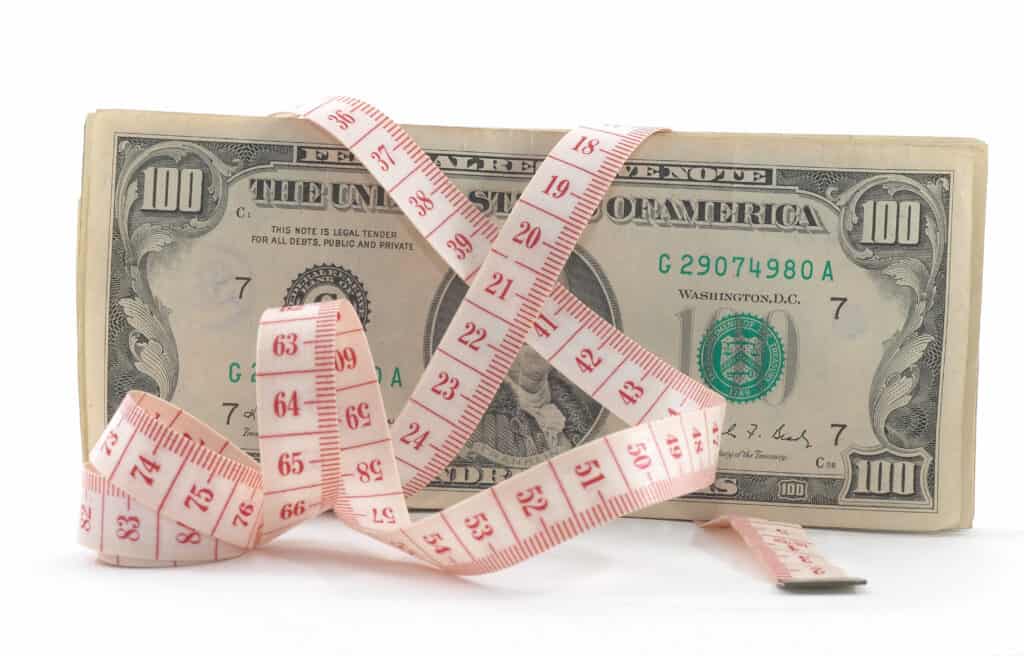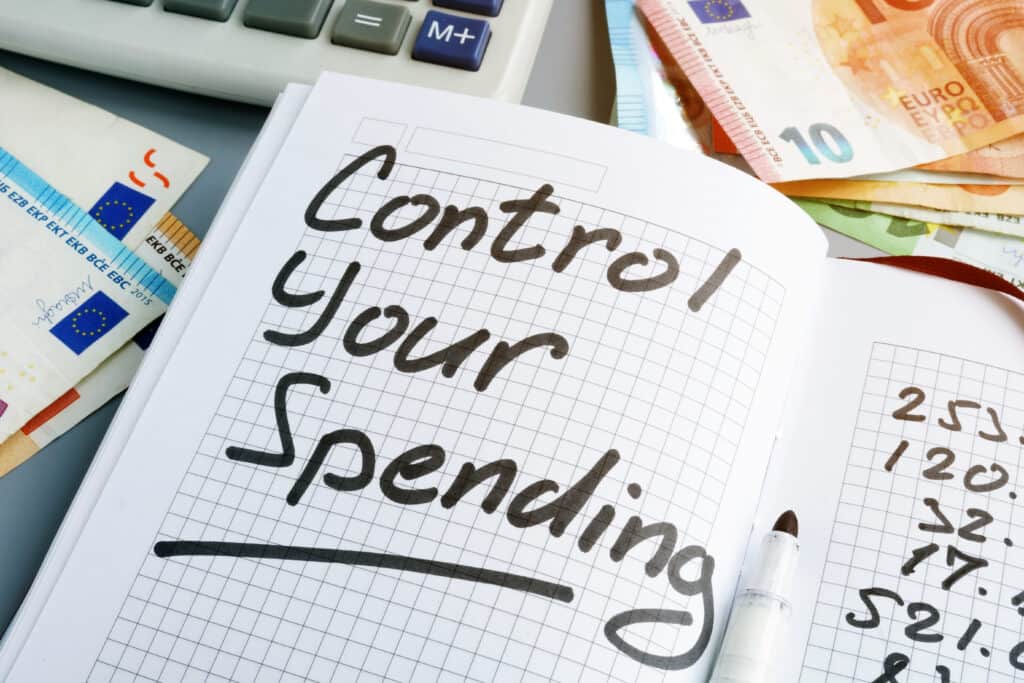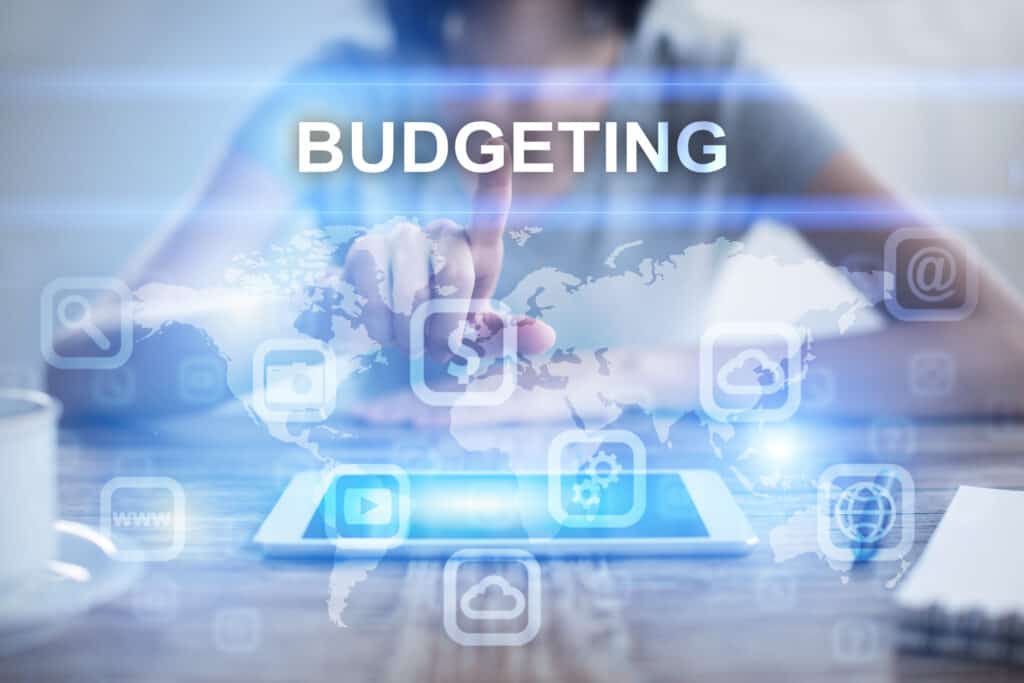Creating a budget and sticking to it is daunting, especially when you’re trying to manage your personal finances. It can feel like hours of tedious calculations or time spent away from shopping for new clothes – neither of which sounds particularly fun. But here’s the thing: taking the time to craft a budget that works for your lifestyle and income level gives you major freedom on multiple levels beyond just saving money.
Building a detailed budget helps you make smarter decisions about what money comes in and goes out, so you can stay within your financial means while still enjoying life and reaching your long-term goals—all things worth getting on board with! In this blog post, we’ll discuss why creating an effective budget takes effort but offers plenty of rewards in return.
Want to see your credit score for free and be able to use many financial tools right now? Just click here!

Understanding your income and expenses
Let’s talk about money – the one thing that every person in this world needs. Whether it’s for fulfilling basic needs or pursuing your dreams, money is essential. But have you ever thought about how much money you earn and how much you spend? Understanding your income and expenses is crucial, not only for making informed financial decisions but also for living a stress-free life.
1. Helps You Achieve Your Financial Goals – If you don’t know exactly how much money you’re making and where it’s going, it’s difficult to identify the areas where you can cut back and save. This is where a budget comes in handy. With a budget, you can identify your priorities and allocate your resources to them. For example, if you’re saving for a car or a down payment on a house, creating a budget will help you identify how much you can afford to save each month towards these goals.
2. Improves Your Spending Habits – A budget helps you to be more mindful of your spending habits. When you have a clear picture of your income and expenses, you will be able to reign in any overspending and identify areas where you can make adjustments. This means that you can start making better decisions about how and where you spend your money. You can also avoid falling into debt and achieve financial freedom.
3. Preparing for Emergencies – One of the biggest benefits of creating and following a budget is that it can help you prepare for emergencies. Let’s say you have some unexpected expenses such as a medical emergency or your car breaks down, but there’s no money set aside to cover these expenses. If you have a budget, you can adjust your spending accordingly, such as cutting back on unnecessary expenses to free up some money for emergencies.
Click Here to Check Your Credit Score for Free!
4. Providing Peace of Mind – When you have a budget, you feel more in control of your finances. You know exactly how much you can spend on different areas of your life, and you can make better financial decisions. This helps you avoid the stress and anxiety that comes with the uncertainty of not knowing where your money is going. With a budget, you can worry less about money and enjoy life more.
5. Helps You Plan for the Future – Lastly, a budget helps you plan for your future. When you have a clear idea of your income and expenses, you can plan out your future expenses such as saving for retirement, education or vacations. You can also monitor your progress towards these financial goals and make adjustments as needed.
Identifying your financial goals and creating a plan to achieve them
Whether you’re looking to get out of debt, save for your dream vacation or simply want to ensure financial stability, identifying your financial goals is the first step towards achieving them. Yet many people overlook this critical step, thinking it’s too complicated, time-consuming, or difficult. However, taking the time to assess where you stand with your finances and where you want to go can help you gain clarity, take control of your money, and achieve the life you’ve always wanted.
The benefits of setting financial goals
Setting financial goals is not just about having a clear idea of where you want to go. It’s also an opportunity to get excited and motivated about your future. When you set a goal, you create a vision that inspires you and makes you feel like anything is possible. As you work towards achieving that goal, you can celebrate the progress you make along the way and become more confident in your ability to manage your finances effectively. Not only that, but setting and achieving financial goals can have a positive impact on your mental health and overall well-being by giving you a sense of purpose and direction.
How to identify your financial goals
To identify your financial goals, start by figuring out what’s important to you. What do you want your life to look like? What are your long-term dreams? Once you have clarity on what matters most, you can create specific, measurable goals that align with your priorities. These goals should be realistic, achievable, and broken down into smaller steps to make them more manageable. For example, if your goal is to save for a down payment on a house, you might break it down into a monthly savings plan, identifying where you can cut back on expenses to free up more money each month.
Creating a plan to achieve your goals
Once you’ve identified your financial goals, the next step is to create a plan to achieve them. This plan should include specific actions you can take to move closer to your goals, such as increasing your income, reducing your expenses or investing in a retirement plan. Creating a budget can also help you achieve your goals by giving you a clear picture of your income and expenses, helping you identify areas where you can make cuts, and ensuring you stay on track with your savings goals.
How to stay motivated and accountable
Setting financial goals is just the beginning. To achieve them, you need to stay motivated and accountable. One way to stay motivated is to track your progress towards your goals regularly. This might be as simple as checking your bank account each week, reviewing your budget monthly or setting reminders to put money towards your savings each paycheck. Another way to stay accountable is by sharing your goals with others. By telling friends, family or a financial advisor about your goals, you can get support and encouragement to keep going, as well as helpful feedback if you get stuck.
Prioritizing your spending and creating a budget that works for you

Let’s be real, creating a budget can feel overwhelming and downright alarming who want to deprive themselves of all the things they love. However, you might be surprised to know that creating and maintaining a budget is one of the best things you can do for your financial health. By prioritizing your spending and creating a budget that works for you, you have control over your money and can make smarter decisions with it.
Making a budget is not just about cutting expenses and avoiding impulse purchases but is about deciding what truly matters to you and allocating your resources accordingly. A budget helps you know where your money is going and helps you identify problem areas where adjustments need to be made. Budgeting can seem like another tedious chore, but it is essential for anyone looking to take control of their financial future.
Understanding Income and Expenses
To create a budget that works for you, it is essential to recognize and understand how much money you are making and spending. It is essential to have a clear understanding of all income sources: salary, bonuses or incentives, investment income, or other sources of earnings. Once you have an idea of your income, you can then create a definitive list of expenses. Expenses can include bills, rent, entertainment, transportation, groceries, and other essential costs. By understanding where your money is going, you can take control of your finances and start allocating your resources strategically.
Prioritize Your Spending
Many individuals make the mistake of focusing on cutting expenses rather than prioritizing their spending. As mentioned, budgeting is not about depriving yourself or cutting out the things you love; it’s about ensuring that you allocate resources for both the essentials and the things that matter to you. By prioritizing your spending, you can make sure that what you value most gets priority in your budget. This means that you can still have the things you love, but you’ll know how to budget them properly.
Cutting Costs
Before you prioritize your spending, it’s essential to know where you can cut costs. Start by looking through your expenses and identifying areas where you might be overspending. These could be monthly subscription services you don’t use or buying a new outfit every week. Once you have identified areas where you can cut back, you can start to allocate available resources. It’s essential to remember that not every expense is equal, so be sure to cut down on extravagant commitments that are not necessary.
Setting Realistic Goals
Once you have a firm understanding of your income and expenses, it’s important to set realistic financial goals for yourself. These goals could be anything from paying off credit card debt to buying a house or a new car. Setting realistic goals means that you can take small steps to reach them every day. This way, you can make progress towards your goals without feeling overwhelmed.
Staying On Top of Your Budget
Creating a budget is just the first step. You need to check on your budget regularly to ensure that you’re staying on track. Make small adjustments quarterly to remain current with trends in expenses and income. It’s important to keep tabs on the budget to see what’s working and what’s not working. This will enable you to make smart changes in a timely manner.
Cutting back on unnecessary spendings in order to save up more money
Living on a tight budget is not easy, especially if you have bills to pay, debts to clear, or money to save for emergencies or future investments. But with discipline and smart financial decisions, you can still enjoy life and achieve your financial goals without overspending or stressing out.
One of the most effective ways to cut back on unnecessary expenses is to create and fine-tune your budget regularly. This can help you see where your money goes, prioritize your expenses, and identify areas where you can save more. In this post, we will discuss why it’s worth your time and effort to create and fine-tune your budget, and how to do it effectively.
Track your expenses
The first step in creating a budget is to track your expenses for a month or two. This includes all your bills, groceries, transportation costs, entertainment, gifts, subscriptions, and any other expenses that you incur on a regular or irregular basis. You can do this manually by using a budgeting app, spreadsheet or notebook, or automatically by linking your bank accounts and credit cards to a budgeting tool.
Categorize your expenses
Once you have a clear picture of your expenses, it’s time to categorize them into fixed and variable expenses. Fixed expenses are ones that tend to stay the same every month, such as your rent or mortgage, car payment or insurance, and utility bills. Variable expenses are ones that fluctuate depending on your lifestyle and choices, such as dining out, shopping, gym membership, and travel. By categorizing your expenses, you can see where you’re spending the most and make adjustments accordingly.
Set realistic goals
Now that you know where your money is going, it’s time to set realistic financial goals for yourself. These can be short-term goals, such as saving up for a holiday or paying off a credit card, or long-term goals, such as building an emergency fund or saving for retirement. By setting specific, measurable, achievable, relevant, and time-bound goals (SMART), you can motivate yourself to stick to your budget and track your progress.
Find ways to save
Once you have a budget and goals, it’s time to find ways to save more money. This can be done by cutting back on unnecessary expenses, such as entertainment, subscriptions, or eating out, negotiating bills, such as internet, phone or insurance, and finding cheaper alternatives, such as shopping at discount stores or buying used items. You can also increase your income by working overtime, freelancing, or starting a side hustle.
Monitor and adjust your budget
Creating a budget is not a one-time thing, but an ongoing process of monitoring and adjusting your expenses and income. You need to check your budget regularly to ensure that you’re sticking to it, track your progress toward your goals, and make changes as needed. It’s important to be flexible and open to new opportunities or challenges, such as unexpected expenses or windfalls, and to adjust your budget accordingly.
Adopting healthy habits that will help you stay on track with your budget
Many people think creating a budget is a daunting task, let alone sticking to it. But let’s face it, if we don’t keep track of our finances, we could end up struggling financially. However, there’s good news – adopting healthy habits can help you stay on track with your budget, making it easier for you to reach your financial goals.
1. Understand Your Finances: Creating a budget will give you an idea of your financial situation. It will show you where your money is going, what your expenses are, and what your financial goals are. This will allow you to understand your finances better, and you can use this information to make informed decisions, such as which expenses you can cut back on to save money.
2. Track Your Spending: Once you have a budget in place, it’s essential to track your spending. This will help you stay on track with your budget and help you avoid overspending. There are many ways to track your spending, such as creating a spreadsheet or using a budgeting app. Regardless of the method, it’s important to review your spending regularly, so you’re aware of how much money you’re spending and where you’re spending it.
Click Here to Buy Stocks and Crypto on eToro!
3. Avoid Impulse Purchases: One of the biggest challenges people face when trying to stick to a budget is impulse purchases. These are purchases that are made without much thought and can be damaging to your budget. To avoid impulse purchases, you can create a shopping list, avoid shopping when you’re hungry, and limit your exposure to sales and promotions.
4. Meal Planning: Another healthy habit that can help you stay on track with your budget is meal planning. Planning your meals in advance can help you avoid eating out, which can be costly, and ensure that you’re staying within your grocery budget. Meal planning can also help you avoid food waste and help you make healthier food choices.
5. Save for Emergencies: Lastly, it’s essential to save for emergencies. Emergencies are unpredictable, but having an emergency fund can help mitigate their impact on your finances. The general rule of thumb is to have three to six months’ worth of expenses saved in an emergency fund. This can help you avoid taking on debt when faced with unexpected expenses.
Utilizing online tools or software to automate the process of tracking your finances

Are you tired of manually tracking your finances, expenses, and budget every month? Does it take up too much time and effort to calculate your finances? Fortunately, there are innovative online tools and software that can help automate the process of tracking your finances. With these tools, you can easily monitor and track your expenses and budget in real-time, saving you time and money.
1. Personal Finance Software – One of the most popular online tools for managing your finances is personal finance software. These tools offer a range of features that are designed to help make money management as efficient and straightforward as possible. They allow you to import bank statements, categorize transactions, set budgets, and monitor spending habits.
2. Budgeting Apps – Mobile budgeting apps are also a great way to track your finances. These apps can send you alerts about your expenses, debt, income, and savings goals. They also provide budgeting tools and resources that can help you learn how to save money and plan your financial future.
3. Cloud Accounting – Cloud accounting offers a way to track your finances and also allows for online invoicing, payments, and statements. This automated process can help reduce time spent on manual accounting and save you money.
4. Savings and Investment Tracking – Some online tools also offer investment and savings tracking features. These allow you to monitor your investment portfolio and track the performance of your savings account.
5. Bill Tracking and Payment – Finally, one of the best ways to automate your finances is to use an online bill payment system. With this, you can schedule your bill payments in advance, and this saves a considerable amount of time by not having to manually pay each bill every month.
Conclusion:
Taking the time to create and fine-tune your budget is definitely worth it in the end. You can start taking control of your finances, set yourself up for success, and finally feel secure in creating a financially stable future. With discipline, you can use your budget to be organized and thoughtful about where your money is going. You’ll also know ahead of time how much money you have available to spend or save each month. You may even find it beneficial to prioritize certain goals over others in order to truly make the most out of what you’re working with.
Having a budget allows you to plan for unforeseen expenses as well as plan for milestones in life such as retirement planning or purchasing a home. Have faith that you are well on your way towards making smart decisions that can help you reach whatever goals come next by keeping track of your finances through a useful budgeting method.
